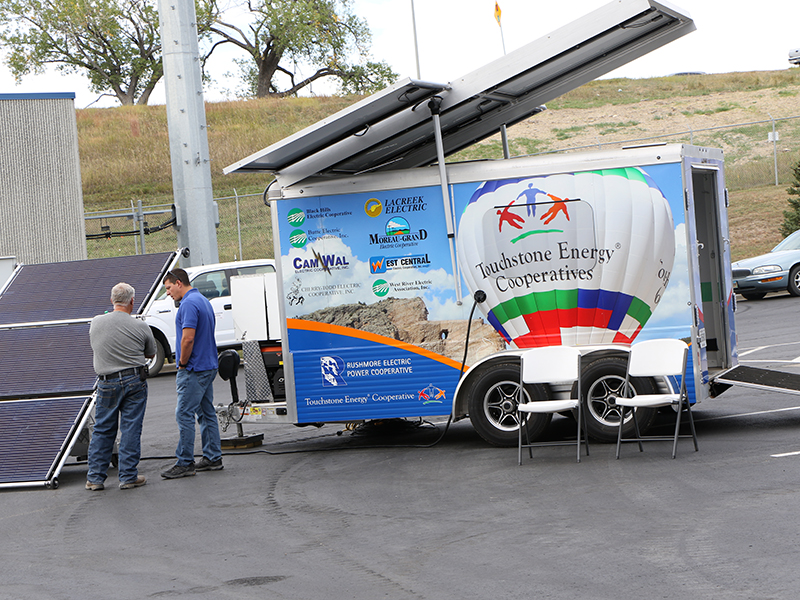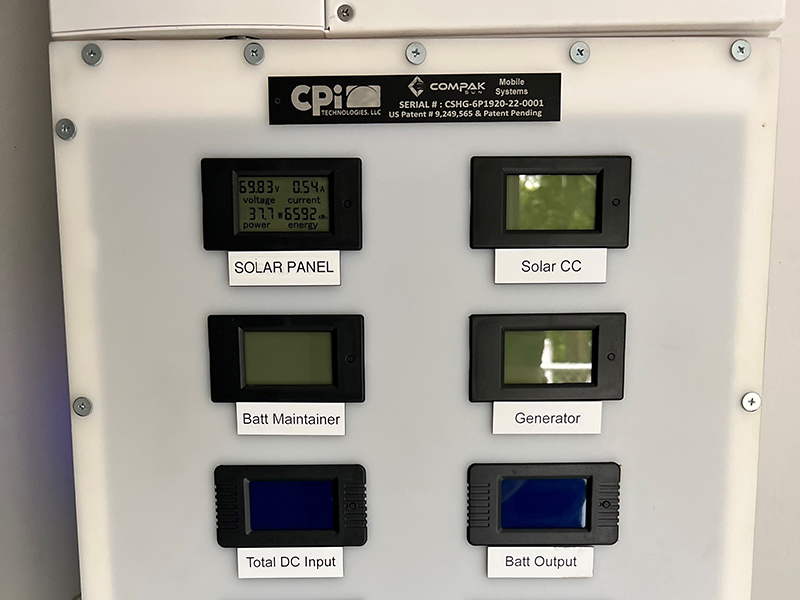- Products
- About
- Responsibility
- Environment
- News
- Contact us
- Careers
-

Solar power comes with many opinions. It is commonly referred to as the cleanest and most environmentally friendly energy source there is. Others say it is unreliable and restricted by geography. Electric cooperatives are taking this chance to educate their members by using a solar trailer to demonstrate how solar power works and help them make an educated, fact-based decision to determine if solar power is right for them.
The trailer, which has been recently used by Basin Electric Class C members West Central Electric Cooperative, located in Murdo, South Dakota, and West River Electric Association, located in Wall, South Dakota, is colorful and flashy with the intent to draw members in during community events.
The trailer includes nine solar panels totaling 1,800 watts and a display that shows members the output of the solar energy.
One of the demonstrations aboard the trailer is the use of batteries. Members can see what it looks like to charge batteries using solar energy and determine how much energy can be used to power devices. Another example is a 1,500-watt space heater: the heater is plugged in during different weather conditions to see how much sun it takes to fully power it. When the sun is not perfectly shining, the heater will not run.
Robert Raker, West River Electric Association manager of Public Relations, says solar power has its place, and it is important for people to understand it is not a ‘one size fits all’ energy source.
“We want to make sure that if members are interested in solar, we can address their expectations,” says Raker. “Sometimes members are not sure if what they are being told is 100% true when it comes to solar. We want them to see that they may still have an electric bill, as solar panels are not battery-operated, and the sun is not always shining.”
Many people ask about net metering, which is a billing mechanism that allows customers who generate their own electricity from solar power to sell the electricity they don’t need back into the grid. The misconception is that energy companies will buy it back for the same price it was sold to them.
“We buy it back at the avoided cost (the minimum amount an electric utility is required to pay an independent power producer), which means when customers install a solar system, they want to make sure they size it to address their load,” says Raker. “We will have members come to us and say they want to have solar energy for when the power goes out. We have the opportunity to tell them that just solar alone will not be enough for that.”

West Central Electric has used the trailer at public events such as their annual meeting. It will be used at member appreciation events in the future.
Jessie Tucker, West Central Electric manager of Member Services, says it is important to educate members about solar power because there seems to be many misconceptions.
“We have roofing contractors that sell and install solar after the meter, and most don’t understand how it actually works,” says Tucker. “The solar trailer allows us to ‘open the door,’ communicate with our membership, and give them true information about what to consider if they are interested in solar installation. We have been the trusted energy advisor for our members for many years, and we want to continue to be, especially now, in an industry that is rapidly changing.”
A message these electric cooperatives want to be clear is they are not anti-solar. They want to make sure their members can make educated and fact-based decisions when it comes to choosing their energy sources. This starts with having something like the solar trailer available for conversation and engagement.
“I believe Basin Electric has done a notable job on addressing the risks and vulnerabilities associated with lowering carbon emissions,” says Tucker. “I think solar generation is another tool that can be utilized in our generation portfolio, especially during our hot summer peaks. However, renewable generation is not reliable enough to solely depend on, and this needs to be explained to our own members on a local level.”
Dakota Gasification Company
Headquarters:
1717 East Interstate Avenue | Bismarck, ND 58503-0564 USA
701.223.0441 | 1.800.242.2372
Great Plains Synfuels Plant
420 County Road 26
Beulah, ND 58523-9400 USA
701-873-2100
A subsidiary of:
Basin Electric wants all interested and qualified candidates to apply for employment opportunities. If you are an applicant with a disability who is unable to use our online tools to search and apply for jobs, or who needs other assistance or accommodations, please contact us at 701-223-0441. Please indicate the specifics of the assistance needed or provide your contact information, and a Basin Electric Human Resources representative will contact you. Basin Electric is an Equal Employment Opportunity Employer regarding race, color, religion, sex, sexual orientation, gender identity, national origin, disability, and veterans status.